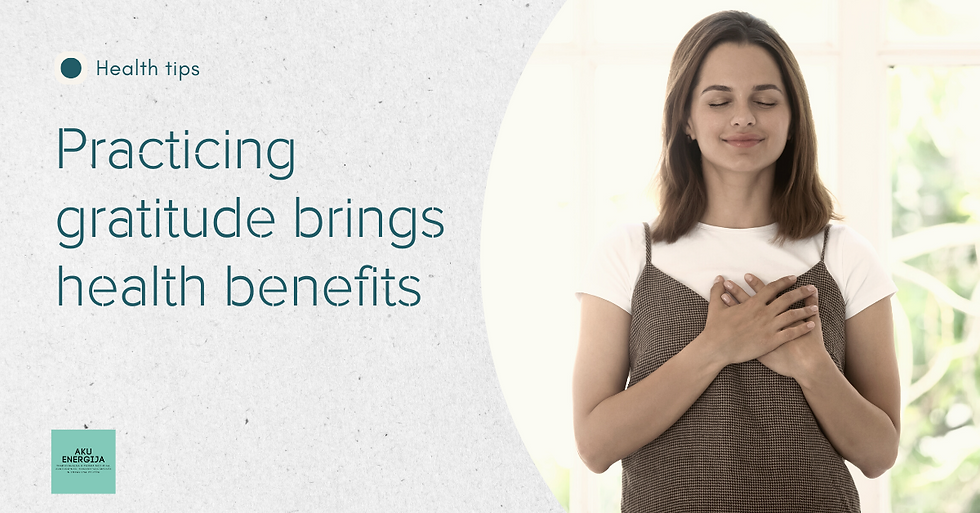Practicing gratitude brings health benefits
- Aku Energija
- Sep 1, 2023
- 4 min read
Many people come to me seeking “treatment” and “medicine”, but very few of them realize, the necessary treatment and medicine are already within themselves. Most of us would not make the connection between our health and gratitude. But the fact is, gratitude affects our physical, emotional, and spiritual bodies.

The word gratitude is derived from the Latin word gratia, which means grace, graciousness, or gratefulness (depending on the context). In some ways, gratitude encompasses all of these meanings. Gratitude is a thankful appreciation for what an individual receives, whether tangible or intangible. With gratitude, people acknowledge the goodness in their lives. In the process, people usually recognize that the source of that goodness lies at least partially outside themselves. As a result, gratitude also helps people connect to something larger than themselves as individuals — whether to other people, nature, or a higher power.
In positive psychology research, gratitude is strongly and consistently associated with greater happiness. Gratitude helps people feel more positive emotions, relish good experiences, improve their health, deal with adversity, and build strong relationships. [7]
Scientifically Proven Benefits of Gratitude
Gratitude opens the door to more relationships. Showing appreciation can help you win new friends. The study found that perceptions of interpersonal warmth (e.g., friendliness, thoughtfulness) serve as the mechanism via which gratitude expressions facilitate affiliation: insofar as gratitude expressions signaled interpersonal warmth of the expresser, they prompted investment in the burgeoning social bond. [1]
Gratitude improves physical health. Grateful people experience fewer aches and pains and report feeling healthier than other people. Grateful people are also more likely to take care of their health. Dispositional gratitude correlated positively with self-reported physical health, and this link was mediated by psychological health, healthy activities, and willingness to seek help for health concerns. [2]
Grateful people sleep better. Three self-help interventions (constructive worry, imagery distraction, and a gratitude intervention), helped university students quiet their minds and sleep better. [3] [Read about TCM tips for better sleep]
Gratitude improves self-esteem. Self-esteem is a positive evaluation of oneself that can facilitate optimal functioning. A 2014 study published in the Journal of Applied Sport Psychology found that gratitude increased athletes’ self-esteem, an essential component to optimal performance. [4]
Gratitude increases mental strength. Gratitude reduces stress and helps to overcome trauma. A 2006 study published in Behavior Research and Therapy found that Vietnam War veterans with higher levels of gratitude experienced lower rates of post-traumatic stress disorder. [5] A 2003 study published in the Journal of Personality and Social Psychology found that gratitude was a major contributor to resilience following the terrorist attacks on September 11. It is clear that positive emotions such as gratitude, interest, and love provide more pleasant subjective experiences than do negative emotions such as anger, sadness, fear, and anxiety. As such, to the extent that positive emotions reduce the focus on negative emotions, they can put people's minds at ease. [6] [Read how TCM can help you achieve deeper relaxation.]
Ways to cultivate gratitude [7]
Here are some ways to cultivate gratitude on a regular basis.
Write a thank-you note. You can make yourself happier and nurture your relationship with another person by writing a thank-you letter expressing your enjoyment and appreciation of that person's impact on your life. Send it, or better yet, deliver and read it in person if possible. Make a habit of sending at least one gratitude letter a month. Once in a while, write one to yourself.
Thank someone mentally. No time to write? It may help just to think about someone who has done something nice for you and mentally thank the individual.
Keep a gratitude journal. Make it a habit to write down or share with a loved one thoughts about the gifts you've received each day.
Count your blessings. Pick a time every week to sit down and write about your blessings — reflecting on what went right or what you are grateful for. Sometimes it helps to pick a number — such as three to five things — that you will identify each week. As you write, be specific and think about the sensations you felt when something good happened to you.
Pray. People who are religious can use prayer to cultivate gratitude.
Meditate. Mindfulness meditation involves focusing on the present moment without judgment. Although people often focus on a word or phrase (such as "peace"), it is also possible to focus on what you're grateful for (the warmth of the sun, a pleasant sound, etc.). [Read more: Simple mindfulness exercises]
Reference
Lisa A. Williams, Monica Y. Bartlett. Warm Thanks: Gratitude Expression Facilitates Social Affiliation in New Relationships via Perceived Warmth.. Emotion, 2014; DOI: 10.1037/emo0000017
Hill PL, Allemand M, Roberts BW. Examining the Pathways between Gratitude and Self-Rated Physical Health across Adulthood. Pers Individ Dif. 2013;54(1):92-96. doi:10.1016/j.paid.2012.08.011
Digdon, N. and Koble, A. (2011), Effects of Constructive Worry, Imagery Distraction, and Gratitude Interventions on Sleep Quality: A Pilot Trial. Applied Psychology: Health and Well-Being, 3: 193-206. https://doi.org/10.1111/j.1758-0854.2011.01049.x
Chen, Lung & Wu, Chia-Huei. (2014). Gratitude Enhances Change in Athletes’ Self-Esteem: The Moderating Role of Trust in Coach. Journal of Applied Sport Psychology. 26. 349-362. 10.1080/10413200.2014.889255.
Kashdan TB, Uswatte G, Julian T. Gratitude and hedonic and eudaimonic well-being in Vietnam war veterans. Behav Res Ther. 2006 Feb;44(2):177-99. doi: 10.1016/j.brat.2005.01.005. PMID: 16389060.
Fredrickson BL, Tugade MM, Waugh CE, Larkin GR. What good are positive emotions in crises? A prospective study of resilience and emotions following the terrorist attacks on the United States on September 11th, 2001. J Pers Soc Psychol. 2003;84(2):365-376. doi:10.1037//0022-3514.84.2.365
https://www.health.harvard.edu/healthbeat/giving-thanks-can-make-you-happier







Comments